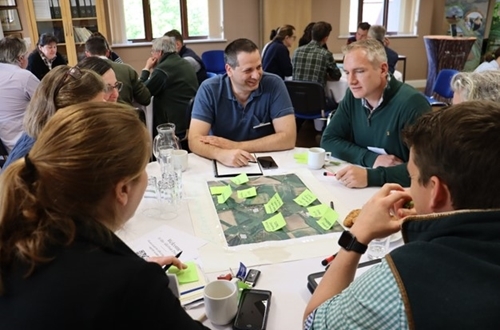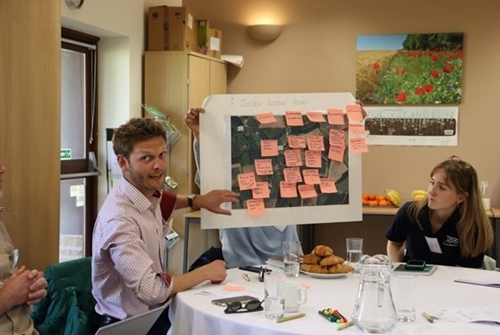
In a world grappling with the urgent need to combat climate change, the agricultural sector is stepping up to the challenge with innovative ideas and collaborative efforts. One example of this is the Climate Neutral Farms project.
The GWCT Allerton Project is leading the UK network of wheat farmers as part of this and on May 16th 2023 we gathered for a “Creative Arena” to discuss progress. The event brought together a diverse group of stakeholders to deliberate on climate-neutral farming practices, emphasizing the importance of reducing greenhouse gas emissions within the agricultural landscape.
Fostering Thoughtful Discussions for Change
The central aim of the Creative Arena was to facilitate constructive conversations between stakeholders, encouraging them to delve into the realm of climate-neutral farming practices. A total of 39 participants, spanning various sectors including farmers, advisory and agronomy experts, grain merchants, researchers, and industry professionals, convened to explore effective strategies for curbing the carbon footprint associated with agricultural activities.
A Glimpse into the Event's Activities
Throughout the day, participants engaged in dynamic discussions that encompassed diverse perspectives and insights. The event was structured around a series of four activities designed to explore and prioritize climate-neutral farming practices:
1. Defining the Ideal Climate-Neutral Farm: Renewable energy, soil health and trees were seen as the most ideal solution
Participants were tasked with envisioning an ideal climate-neutral farm, considering the principles that could foster such an environment. The focus was on embracing innovative practices that could contribute to a greener and more sustainable farming landscape. During this activity, the most frequently mentioned principles were using renewable energy, improving soil health, and planting more trees and hedgerows.
2. Measuring Impact and Feasibility: Stakeholders deem high n-efficiency crops the easiest and most impactful principle
Stakeholders evaluated the impact and feasibility of ten designated climate-neutral principles. They ranked these principles based on their perceived effectiveness in achieving climate neutrality. This activity highlighted both the potential benefits and the challenges associated with each principle.
'Growing species or varieties with higher n-use efficiency' was deemed the easiest and most impactful principle to implement. Farmers highlighted the use of nitrogen fertilizers as the largest issue in carbon output in their supply chain, and reducing reliance on synthetic nitrogen would help achieve a more climate-neutral supply chain.
3. Identifying Barriers and Prerequisites: availability, equipment, markets, cashflow and changing practices
Participants identified barriers that could impede the implementation of climate-neutral practices. Simultaneously, they brainstormed solutions and prerequisites that could pave the way for successful adoption.
The most repeated barriers for all principles were availability/suitability, equipment access, market requirements/demand, cashflow effects and ultimately the change of implementing a new practice on-farm. The prerequisites which were consistently mentioned include improved knowledge and education, improved market outlook, grants and strategy for improvements.
Overall, implementing new practices on-farm can be a challenging process. However, with improved knowledge and education, a better understanding of market demands, access to grants, and a solid strategy for improvement, these barriers can be overcome. It is important for farmers to prioritize these prerequisites in order to successfully implement new and beneficial practices on their farms.
4. Prioritizing Key Principles: fertiliser and cover crops focus of stakeholder preferences
The final activity involved stakeholders expressing their preferences for specific climate-neutral principles. This allowed for a collective understanding of which practices resonated most strongly across different stakeholder groups.
The main categories mentioned were fertilizer use and cover crops and legumes in crop rotation, which many farmers were already implementing or willing to consider. Companion cropping/intercropping and livestock incorporation were mentioned the least by non-farming stakeholders, as they are driven by on-farm decisions.

Key Takeaways and Insights
Several key principles emerged as central themes during the discussions:
- Reduced Fertilizer Use: Stakeholders acknowledged that reducing reliance on synthetic nitrogen fertilizers held considerable potential for mitigating the carbon impact of farming practices.
- Diverse Crop Rotations: Diversifying crop rotations emerged as a practical strategy, offering multiple benefits including improved soil health, reduced pest pressure, and enhanced resilience against climate fluctuations.
- Agroforestry and Biodiversity: The inclusion of agroforestry practices and increased biodiversity through hedgerows and trees gained traction. While perceived as challenging, these practices held significant potential for carbon sequestration and ecosystem enhancement.
- Cover Crops and Legumes: Integrating cover crops and legumes within rotations garnered attention for their positive impact on soil health and nitrogen fixation, further aiding in reducing carbon emissions.
Collaboration as the Key to Success
The Creative Arena emphasized the need for collaboration across the entire agricultural spectrum. The collective effort to engage farmers, industry professionals, researchers, policymakers, and other stakeholders underscores the commitment to achieving climate-neutral farming by 2050.
By embracing a collaborative approach and focusing on interactive solutions, the event's discussions demonstrated that the journey towards climate-neutral farming is complex, requiring a concerted effort from all corners of the industry. It was evident that the alignment of policies, financial support, knowledge sharing, and technological advancements will be pivotal in realizing a greener and more sustainable future for European agriculture.
The Climate Neutral Farms project is working with ten wheat farmers in the east to catalyse and track this journey and work with the farmers to move towards more climate neutral systems. To read more about the Climate Neutral Farms project, and Allerton’s involvement please visit here and contact nlovatt@gwct.org.uk if you would like to go on our mailing list for events and updates.